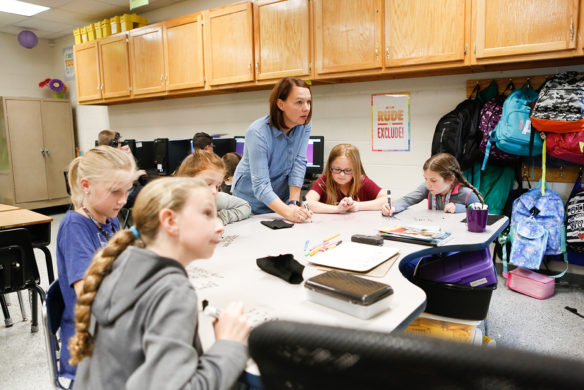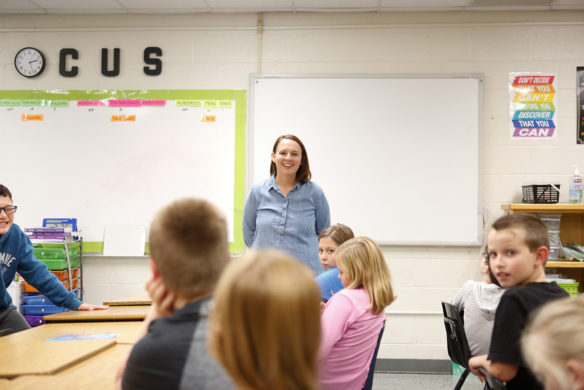
Pulaski County native Sarah Burnett, a 4th-grade mathematics teacher at Shopville Elementary School, is the new chair of the Education Professional Standards Board. While having a classroom teacher chair EPSB is relatively uncommon, Burnett said her daily experiences give her a good idea of what teacher preparation programs need to look like and what kind of support new teachers need.
Photo by Mike Marsee, Sept. 27, 2018
By Jennifer Ginn
Jennifer.ginn@education.ky.gov
Pulaski County native Sarah Burnett, a 4th-grade mathematics teacher at Shopville Elementary School (Pulaski County), is the new chair of the Education Professional Standards Board.
While the 15-member board – comprised of teachers, school administrators, local board of education members and representatives of postsecondary institutions – is charged with setting performance standards for teachers, the chair of the board is most often an administrator or higher education representative. Since 2010, only one other chair has been a classroom teacher.
Burnett, who earned her bachelor’s degree in elementary education from Eastern Kentucky University in 2007, has taught intermediate mathematics in Pulaski County for 11 years. She has two sons, a 2nd-grader and a preschooler, who attend Pulaski County schools.
Burnett originally was appointed to the EPSB board in 2016 to fill out an unexpired term, and was reappointed by Gov. Matt Bevin in June of 2017 to a term that will expire in 2021. Kentucky Teacher staff had a chance recently to ask her about her priorities while serving as chair of the EPSB. Here’s what she had to say.
Why did you get into teaching?
“I became a teacher because education is invaluable and I believe it is the cornerstone of our society. I have a passion to learn and I want to share that passion with others. I want to make a difference in the lives of children who have no one at home to look up to, to give poverty-stricken kids a road to prosperity and to instill the love for learning in the heart and minds of my students.
“Nothing is more rewarding than seeing your former students get scholarships, succeed in college or start a new job. I tell my students frequently, ‘I can’t wait to see what you become!’ I became a teacher so I can be a small part of that.”
Why were you interested in serving on the Education Professional Standards Board?
“I believe every child deserves a qualified, effective and ethical teacher to stand before them each day. I am a teacher, a taxpayer and a mother; wearing those three hats gives me a diverse perspective of what is expected of educators from the inside and the outside. Serving on the EPSB has allowed me to be a part of a lot of decisions that impact students and educators across the Commonwealth.”
While nine members of the EPSB board are classroom teachers, the chair often has been a school administrator or someone from higher education. What kind of perspective can a classroom teacher bring to the role?
“The majority of certificates issued and renewed by EPSB are for classroom teachers; so I think it is logical that a teacher is the chair. I attend board meetings on a Monday and I am back within the walls of my classroom on Tuesday morning.
“Being an active teacher and having served as a resource teacher to new teachers going through the Kentucky Teacher Internship Program, I think I have a huge advantage when making decisions regarding education preparation providers. Because I do this job every day, I think I have a good idea of what teacher preparation needs to look like, what support new teachers need and what supports current teachers need. I am constantly looking at decisions from teachers’ perspectives and thinking, ‘How will this affect my students and my colleagues?’”
The recent EPSB decision to not require teachers to earn a Rank II certification to keep on teaching after 10 years has stirred up some controversy. What drove the board’s decision?
“I currently hold a master’s degree and doctorate, so yes, I value higher education and believe teachers must be lifelong learners to stay afloat in this career. The removal of the Rank II requirement was brought up during the October 2016 meeting. The board was addressed by a superintendent who asked us to expand certification eligibility options to educators who do not desire to pursue graduate school. Teacher stress and the large amount of student loans caused by this requirement were a concern.
“After discussion amongst board members, we made appointments to an ad hoc committee to review expanding certificate options for Rank II at the February 2017 meeting. The board received six recommendations from the committee that June. Their first recommendation was to remove the mandatory requirement for an educator to obtain a Rank II as outlined in 16 KAR 8:020.
“This decision was not taken lightly by any parties involved. A lot of time and consideration was put into the decision. We looked at the impact this would have on student achievement, the affect this decision would have on the educator preparation providers and what was best for Kentucky’s teachers.
“Fast forward to the August 2018 meeting when the board waived the requirement. EPSB did not remove the Rank II, we waived the mandatory requirement for an educator to obtain a Rank II. The requirement was removed so that teachers can choose when they want to work on their master’s, so that it doesn’t have to be completed the first part of their career. Hopefully this will give them some freedom with their families, finances, life, etc. It is my hope that all teachers get their master’s degree, but it no longer has to be completed to keep their certificate.”

Fourth-grade mathematics teacher Sarah Burnett has taught intermediate mathematics in Pulaski County for 11 years. She has two sons, a 2nd-grader and a preschooler, who attend Pulaski County schools.
Photo by Mike Marsee, Sept. 27, 2018
How has serving on the board helped you in your classroom as a teacher?
“Honestly, it lets me see how lucky I am to be a teacher. Being a teacher is a serious job with a lot of responsibility, a responsibility that cannot be taken lightly.”
What kind of impact would you like to have on the EPSB during your tenure as chair?
“I hope that during my time on the board we make decisions that ensure all students have great teachers who are well prepared, effective and ethical. Like I said, I am a mom, so on tough decisions I catch myself wondering, ‘What do I expect of my boys’ teachers?’
“I am blessed to be in the position that I can help to make decisions that will positively shape education in the Commonwealth.”




Leave A Comment